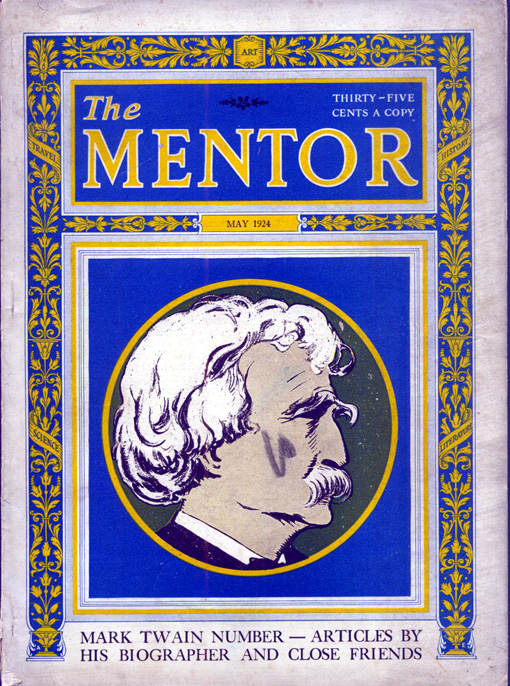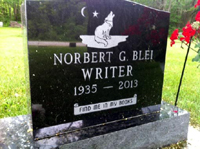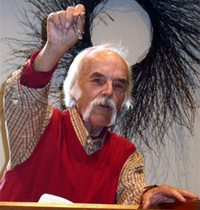
NOTES from the UNDERGROUND No. 211 | January 10, 2011
MARK TWAIN——-REVISED
by
Norbert Blei
“It is better to keep your mouth shut and appear stupid than to open it and remove all doubt.”—Mark Twain
If he’s not our greatest American writer, he’s certainly our most beloved. His legacy to American letters runs deep. Old Hem drew the line in the sand in his beautiful book, GREEN HILLS OF AFRICA (1935) when he stated in chapter one: “All modern American literature comes from one book by Mark Twain called Huckleberry Finn. If you read it you must stop where the Nigger Jim is stolen from the boys. That is the real end. The rest is cheating. But it’s the best book we’ve had. All American writing comes from that. There was nothing before. There’s been nothing as good since.”
Enter the academics of today, the ‘politically correct’ to revise our literary history. Make it safe. Twain dealt with enough stupidity of this sort in his own time and made a career of mocking it in talks and print, in a style uniquely his own. Tell it as it is (and have fun telling it).
Midwestern. American. Real.
(No bullshit.)
His defense rests—in all his works.
On the plus side of this new, revised edition of “Huckleberry Finn” that substitutes the word “slave” for “nigger” (edited by Prof. Alan Gribben for NewSouth Books, to be released in February) is that no school yet has expressed an interest in teaching it. On the minus side, the publisher’s comment that Barnes & Noble, Borders, and other bookstores have registered advanced orders—and that she was expecting orders from schools and libraries.
Here’s hoping the book bombs. Here’s hoping schools and libraries, especially, see the light of day: the truth of Twain.
Here’s hoping Prof. Gribben finds work editing romance novels.
If academia deems it necessary to protect our culture from Mark Twain, just imagine who? what? next.
And if a high school English teacher (who admires Twain) declines to teach “Huckleberry Finn”… “because it is too long” I suggest she relieve herself from the serious work of educating our youth.
Mr. Twain, I leave you the last word:
“The difference between the right word and the almost right word is the difference between lightning and the lightning bug.,”—Mark Twain
A recent, short, and best biography of Twain in a long time. Packed with pertinent information, reads like a novel. From: The Library of American Biography. Author, David W. Levy, Prentice Hall, 2010.
PUBLISHER TINKERS WITH TWAIN
by
Julie Bosman (with Tamar Lewin)
A new edition of “Adven¬tures of Huckleberry Finn” is missing something: the n-word.
In its place, 219 times throughout the book, is the word “slave,” a substitution that was made by NewSouth Books, a publisher based in Alabama, which plans to release the edition in February.
Alan Gribben, a professor of English at Auburn University at Montgomery, approached the publisher with the idea in July. Mr. Gribben said Tuesday that he had been teaching Mark Twain for decades and always hesitated before reading aloud the common racial epithet, which is used liberally throughout the book, a reflection of social attitudes in the mid-19th century.
“I found myself right out of graduate school at Berkeley not wanting to pronounce that word when I was teaching either ‘Huckleberry Finn’ or ‘Tom Sawyer’ ” he said. “And I don’t think I’m alone.”
Mr. Gribben, who combined “Huckleberry Finn” with “Tom Sawyer” in a single volume and also supplied an introduction, said he worried that “Huckleberry Finn” had fallen off reading lists, and wanted to offer an edition that is not for scholars, but for younger people and general readers.
“I’m by no means sanitizing Mark Twain,” Mr. Gribben said. “The sharp social critiques are in there. The humor is intact. I just had the idea to get us away from obsessing about this one word, and just let the stories stand alone.” (The book also substitutes “Indian” for “injun.”)
Since the publisher discussed plans for the book this week with Publishers Weekly, it has been “assaulted” with negative e-mails and phone calls, said Suzanne La Rosa, the co-founder and publisher of NewSouth Books.
“We didn’t undertake this lightly,” Ms. La Rosa said. “If our publication fosters good discussion about how language affects learning and certainly the nature of censorship, then difficult as it is likely to be, it’s a good thing.”
The news set off a storm of angry online commentary, scolding the publisher for “censorship” and “political correctness,” or simply for the perceived sin of altering the words of a literary icon. Twain admirers have turned his hefty “Autobiography of Mark Twain,” published last year, into a best seller.
An initial print run of 7,500 copies has been planned for the revised “Huckleberry Finn.” The print edition is scheduled for publication in February, and a digital edition could go on sale as early as next week.
Mr. Gribben said no schools had expressed interest yet in teaching the book — nor did he say what ages he thought the edition appropriate for. In his introduction, however, he writes that “even at the level of college and graduate school, students are capable of resenting textual encounters with this racial appellative.”
Ms. La Rosa said the publisher has had advance orders from Barnes & Noble, Borders and other bookstores, and she expected more orders from schools and libraries.
Some English teachers were less than thrilled about the idea of cleaning up a classic.
“I’m not offended by anything in ‘Huck Finn” said Elizabeth Absher, an English teacher at South Mountain High School in Arizona. “I am a big fan of Mark Twain, and I hear a lot worse in the hallway in front of my class.”
Ms. Absher teaches Twain short stories and makes “Huck Finn” available but does not teach it because it is too long — not because of the language.
“I think authors’ language should be left alone,” she said. “If it’s too offensive, it doesn’t belong in school, but if it expresses the way people felt about race or slavery in the context of their time, that’s something I’d talk about in teaching it.”
[from THE NEW YORK TIMES Jan. 5, 2011]
THAT’S NOT TWAIN
Next month, you will be able to buy the single-volume NewSouth Edition of Mark Twain’s “The Adventures of Tom Sawyer” and “Adventures of Huckleberry Finn,” edited by Professor Alan Gribben of Auburn University at Montgomery. It differs from other editions o those books because Mr. Gribben has turned the word “nigger” — as used by Tom and Huck — into “slave.” Mr. Gribben has also changed “Injun” to Indian, Mr. Gribben says he wants to make these American classics readable again — for young readers and for anyone who is hurt by the use of an epithet that would have been ubiquitous in Missouri in the 1830s and 1840s, which is when both books are set. He says he discovered how much Twain’s language offended readers when he began giving talks about “Tom Sawyer” all across Alabama in 2009. He has also acknowledged that what he calls “textual purists” will be horrified by his sanitized versions of the two classics.
We are horrified, and we think most readers, textual purists or not, will be horrified too. The trouble isn’t merely adulterating Twain’s text. It’s also adulterating social, economic and linguistic history. Substituting the word “slave” makes it sound as though all the offense lies in the “n-word” and has nothing to do with the institution of slavery. Worse, it suggests that understanding the truth of the past corrupts modern readers, when, in fact, this new edition is busy corrupting the past.
When “Huckleberry Finn” was published, Mark Twain appended a note on his effort to reproduce “painstakingly” the dialects in the book, including several backwoods dialects and “the Missouri negro dialect.” What makes “Huckleberry Finn” so important in American literature isn’t just the story, it’s the richness, the detail, the unprecedented accuracy of its spoken language. There is no way to “clean up” Twain without doing irreparable harm to the truth of his work. I
[from: The editorial page of The New York Times, January 6, 2011]






























































This book has been banned and distorted so much it’s old hat to see another editor/publisher who can’t leave it alone. Those who dislike history rewrite it; those who dislike great literature rewrite it. Leave the work alone. Leave the author alone. I’m tired of do-gooders doing damage to great works.
Totally agree = opposed to the text being changed.
BUT … I heard the interview last week with the Prof. who did so, and found merit in his premise that, by doing so, the books may now have opportunity to be read in some of the schools that have banned them because of the discomfort stemming from this language. So … perhaps it is better that those schools, who would not give ANY exposure to these texts, at least give half a loaf to the students, which might then linger in memory and encourage them to re-read at a later time. This has some legitimacy, to me.
May Thor with his hammer save us from the politically correct.
Teach the children the truth. Make them think, do not think for them.
An appropriate time for this subject with all that is being said in the media this week about freedom of speech. I support the First Amendment. I also don’t use all the words that I know or can use all the time. Writers spend hours, days choosing the right words. Do we think fast enough, to be as careful, and caring in our speech? I can’t excuse revisionist editing. If you can’t read the original disturbing words of Huckleberry Finn, from where will come the lesson on history,politics, language, and personal choice that these words evoke? And without these lessons, how will anyone learn to think critically and make their own choices?
Well said everyone. My piano teeacher said it was okay to improvise a piano piece only AFTER I learned to play it the way the composer had written it. Taking away Twain’s language takes away all our learning about those times and what it takes to change the minds of the many.
This is a fabulously fabulous-as-always Blei post today.
As a longtime reader of your dispatches, I was stunned (overwhelmed?) by your sweet mention of my biography of Mark Twain. Praise is always welcome, of course, but when it comes from a pro like yourself, it is especially to be treasured. Many thanks! (And, by the way, I share in the general outrage about the new version of HUCKLEBERRY FINN—not only because we don’t tamper with classics, but also because it assumes that “slave” is somehow a nicer thing to call a person than “nigger.”)
To hear the “N” word dozens, if not hundreds of times, one has only to attend an evening of slam poetry populated by African-Americans. They have, rightly, taken proprietary ownership of the word. It is part of their history, not to be denied, and when they sang “We Shall Overcome”, they claimed ownership of their history. To pretend either that that word was not used, did not hurt, cannot still hurt, or to pretend that the sanitizing of great works of literature does not hurt, is ridiculous. If I could find anything racist in the STORY TWAIN TOLD, I might be more than willing to ban or burn the book, but I can not. Certainly, when we read Huck Finn to our young sons, we had a discussion. Isn’t that how teaching and learning work?
It’s all been said above. The next storm will come when Twain’s work that even he thought was too strong for his contemporaries to stomach, is finally going to be released long after his death as he requested.
Should be interesting. He once villiafied Mary Baker Eddy founder of Christian
Science, and later apologized.
He was a moral man who did not believe in God. He made people laugh,
and that made him a God in his own way.
Re “Publisher Tinkers With Twain” (The New York Times, Jan. 5):
I, too, am an English teacher and can sympathize with Gribben’s discomfort with saying such an ugly word in front of one’s students. Luckily, this novel is not a book I teach, and so I don’t have to wrestle with this question. But I dare say, I would sacrifice my discomfort to re-writing such a classic.
As a middle school writing teacher, I have posted on the bulletin board in my classroom an inspirational quote of Twain’s, which in the case of my response to this article ironically reads: ““The difference between the right word and the almost right word is like the difference between lightning and a lightning bug.”
I don’t see how “slave” is less ugly than the word it’s replacing.
Twain employed the language and dialects of the time and
place to alter and sanatize that language serves only to blur
the emotional and physical butality african americans were
subjected to. why not alter passages in other books that
depict slaves being whipped …. as being whipped with
ribbons ? huck finn is an american masterpiece leave italone